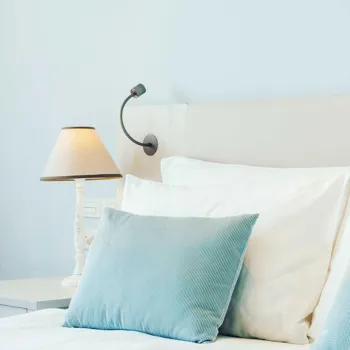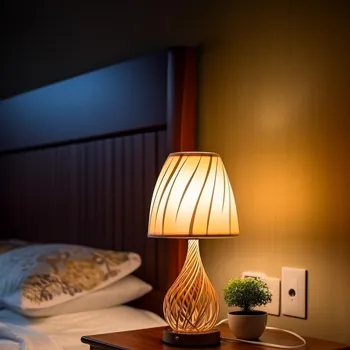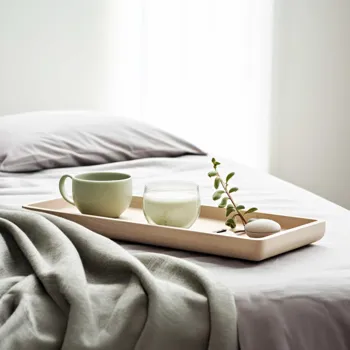Discover 8 Lifestyle Changes for Better Sleep Quality: Neend Aayegi Mast! Dive into tips for rejuvenating sleep!
Namaste, readers! Feeling tired even after a full night? Toss and turn in bed like a chapati
on a hot tawa? You're not alone! In today's fast-paced world, good sleep can feel like a luxury.

But trust us, getting enough shut-eye is not just about feeling refreshed; it's crucial for your overall health and happiness. Lack of proper sleep can lead to all sorts of problems – from low energy and poor concentration to weakened immunity and even mood swings.
So, how do we catch those elusive zzz's and wake up charged like a mobile phone after a quick charge? Don't worry, we've got you covered! Here are eight simple lifestyle changes you can incorporate into your routine for better sleep quality.
These are easy to follow and will help you drift off into a peaceful slumber. Say goodbye to sleepless nights and hello to a rejuvenated you! So, let's dive in!
Set a Sleep Schedule: Your Body's Personal Clock
Think of your body like a well-oiled machine; it thrives on regularity. Having a consistent sleep schedule is like setting your internal alarm clock.
Going to bed and waking up around the same time every day, even on weekends, helps regulate your body's natural sleep-wake cycle, also known as your circadian rhythm. This rhythm controls the release of hormones like melatonin, which makes you feel sleepy, and cortisol, which makes you feel alert.
When your circadian rhythm is off, it can lead to difficulty falling asleep, staying asleep, and waking up feeling refreshed. Imagine your body is a train; a proper sleep schedule keeps it running on time.
When you have irregular timings, your body gets confused about when to release these hormones. This can result in a feeling of crankiness and low energy. This also helps in maintaining a constant level of hormonal release to keep your body feeling energetic.
Creating a sleep schedule doesn't need to be complicated. Start by choosing a bedtime and wake-up time that you can realistically stick to most days. Then, gradually adjust your schedule until you reach your desired times.
For example, if you currently go to bed at 1 AM and want to go to bed at 11 PM, try going to bed 15 minutes earlier each night. Once you have established a sleep schedule, make an effort to stick to it as much as possible.
This will help your body adjust to the new routine and improve your sleep quality over time, like planting a tree so it may give you shade one day. Consistency, is indeed the key for improvement in quality and quantity of sleep.
The body is an amazing creation of nature, and it usually responds to regular practices. You could give your body some time to show some results.
Create a Relaxing Bedtime Routine: Wind-Down Time!
Just like you wouldn't jump into a cold swimming pool without easing into it, you shouldn't jump straight into bed without preparing your mind and body for sleep. A relaxing bedtime routine signals to your brain that it's time to wind down and prepare for rest.

Think of it as a gentle lullaby for your senses. This could involve a variety of activities, such as taking a warm bath or shower, reading a book, listening to calming music, practicing gentle stretching or yoga, or meditating.
The important thing is to choose activities that you find enjoyable and that help you relax and de-stress, like a soothing cup of herbal tea. So, instead of immediately heading to bed in a frenzied rush, try and set some time aside to let your system slow down.
This could also mean doing less strenuous activity, which will give the body a better chance to sleep.
Avoid screen time, yes avoid that mobile phone!
The blue light emitted from electronic devices like smartphones, tablets, and laptops can interfere with melatonin production and make it harder to fall asleep, so avoid screen time 1 to 2 hours before bed or consider getting blue light lenses. Create a calm and comfortable sleep environment.
Make sure your bedroom is dark, quiet, and cool. Use blackout curtains, earplugs, or a white noise machine to block out distractions. Invest in comfortable bedding, such as a supportive mattress, soft pillows, and breathable sheets. Remember, your bedroom should be a sanctuary for sleep.
So, choose those things which could help you relax and get into a peaceful state of mind. Make a mental list of things you are grateful for, instead of worrying about things which you cannot control. In the long run, a calm state of mind will result in better sleep.
Watch What You Eat and Drink: Fuel for Good Sleep
What you put into your body can significantly impact your sleep quality. Eating a heavy meal close to bedtime can disrupt your sleep as your body works hard to digest the food. Avoid large meals, especially those high in fat or sugar, within 2 to 3 hours of bedtime.

Instead, opt for a light snack if you're feeling hungry, such as a small bowl of cereal, a piece of fruit, or a handful of nuts. Try to add into your daily routines some food that has nutrients that improve blood circulation.
It is advisable to seek the counsel of a qualified physician if you feel that it is difficult to manage the changes on your own. Remember that it is also good to do this over a long period of time, so that it gives your body a chance to adapt, and not go into shock. Also listen to your body.
It will be able to tell you when to slow down.
Caffeine and alcohol can also interfere with sleep. Caffeine is a stimulant that can keep you awake and prevent you from falling asleep easily. Avoid caffeine-containing beverages like coffee, tea, and soda in the afternoon and evening.
Alcohol, while it may initially make you feel sleepy, can disrupt your sleep later in the night and lead to fragmented sleep. Limit your alcohol consumption, especially close to bedtime, and drinking water is always a good choice.
If your body happens to wake you up during the night, that will be a great opportunity to grab some water. So be prepared. This is an important aspect of taking care of your body- give it time.
Regular Exercise: Sweat Your Way to Sleep
Regular physical activity can improve your sleep quality by reducing stress, improving your mood, and regulating your body's natural sleep-wake cycle. Aim for at least 30 minutes of moderate-intensity exercise most days of the week.

Activities like brisk walking, jogging, swimming, or cycling are all great options. However, avoid intense exercise close to bedtime, as it can have a stimulating effect and make it harder to fall asleep.
A long and difficult exercise session close to bedtime is likely to tire out your muscles, but it will not help you sleep better. Light exercise like yoga or walking will promote blood circulation and get you in the zone for sleep.
Ideally, schedule your workouts for the morning or afternoon.
If you prefer to exercise in the evening, make sure to finish at least 3 hours before bedtime to allow your body time to cool down and relax. Incorporate stretching and yoga into your routine to increase flexibility and reduce muscle tension.
This can help you feel more relaxed and comfortable in bed. Regular exercise is not only fantastic for your sleep but also for your overall health and well-being. The benefits are numerous. Try including some exercise in your day, where the weather is mild.
Be it running, walking, or jogging- all of this will lead to a better quality of life, which will surely lead to better sleep.
Manage Stress: Calm Your Mind, Sleep Soundly
Stress is a major sleep thief. When you're stressed, your body releases hormones like cortisol, which can interfere with sleep. Finding healthy ways to manage stress is essential for improving your sleep quality.
There are many techniques you can try, such as meditation, deep breathing exercises, yoga, spending time in nature, or talking to a friend or therapist. So identify what is stressful and find ways to manage it.
This is especially important for those engaged in work activities, which often create a lot of stress. At no time is it required to let feelings of stress take over, and try to implement some means of relaxation.
Meditation and deep breathing exercises can help calm your mind and relax your body.
Try practicing these techniques for a few minutes each day, especially before bed. Yoga combines physical postures, breathing exercises, and meditation to promote relaxation and reduce stress. Spending time in nature has been shown to have a calming effect on the mind and body.
Take a walk in a park, hike in the woods, or simply sit outside and enjoy the fresh air. Talking to a friend or therapist can help you process your emotions and develop coping strategies for managing stress. So breathe.
Sunlight Exposure: Let the Light In!
Exposure to natural sunlight, especially in the morning, helps regulate your body's natural sleep-wake cycle. Sunlight helps suppress the production of melatonin, the hormone that makes you feel sleepy, and increases the production of cortisol, the hormone that makes you feel alert.

Aim for at least 30 minutes of sunlight exposure each day, especially in the morning. You can take a walk outside, sit by a window, or even just open your curtains to let the sunlight in. Do be cautious when out in the Sun. Sunlight can also damage the skin, so do be careful about that.
Sunlight is more beneficial later in the day, after the sun has warmed up and produced Vitamin D to the body. Exposure to sunlight improves mood and focus. Sunlight also helps regulate your body's vitamin D levels, which are important for overall health.
Sunlight can improve energy levels, especially if you have been tired or lacking energy. It's important to balance sunlight exposure with sun safety measures. Wear sunscreen, sunglasses, and a hat when spending time in the sun, especially during peak hours.
So, make time to spend outside, but please do take safety measures.
Comfortable Sleep Environment: Your Sleep Sanctuary
The environment in which you sleep plays a significant role in the quality of your sleep. Create a bedroom that is conducive to sleep by making it dark, quiet, and cool.

Use blackout curtains to block out light, earplugs to block out noise, and adjust the thermostat to keep your room at a comfortable temperature. If you are comfortable with the temperature of the environment you are sleeping in, then that works wonders for your sleep cycle.
The body adjusts accordingly. The bedroom is the place where you would like to retire, and go to sleep, so take it to heart.
Invest in comfortable bedding that promotes relaxation. Choose a supportive mattress, soft pillows, and breathable sheets.
Make sure your bedding is clean and free of allergens. Consider using a white noise machine or fan to mask distracting sounds. This can help you fall asleep faster and stay asleep longer. Personalise your bedroom to reflect your style and preferences.
Add calming artwork, plants, or other decorations that make you feel relaxed and comfortable. This is where we want you to sleep well, so make it comfortable.
Limit Naps, Especially in the Afternoon:
Naps can be both beneficial and detrimental to sleep, depending on their timing and duration. Short naps (20-30 minutes) can improve alertness and performance, but longer naps, especially in the afternoon, can interfere with your nighttime sleep.

Naps can be helpful to improve focus, so short naps will work better in this case. Afternoon naps can make it difficult to fall asleep at night, and also give a feeling of unease in the mornings.
If you feel the need to nap, try to keep it short and sweet, and avoid napping after 3 PM.
If you are having trouble sleeping at night, try eliminating naps altogether. By eliminating the nap, the body can feel naturally tired at night, and fall asleep at the appropriate time. This can help to improve sleep at night, and also reduce dependence on daylight naps.
So, be it daylight naps or not, listen to your body and it's requirement.
By incorporating these eight lifestyle changes into your daily routine, you can significantly improve your sleep quality and wake up feeling refreshed and energized. Remember, consistency is key.
It may take some time for your body to adjust, but with patience and perseverance, you can achieve better sleep and enjoy a more fulfilling life. Sweet dreams, folks!
AI Generated Content. Glance/InMobi shall have no liability for the content




















